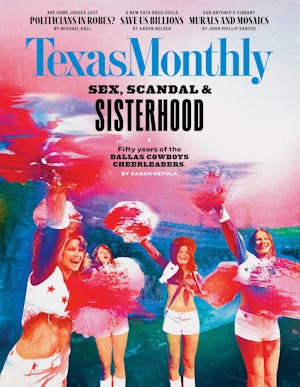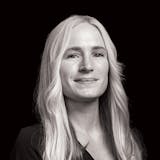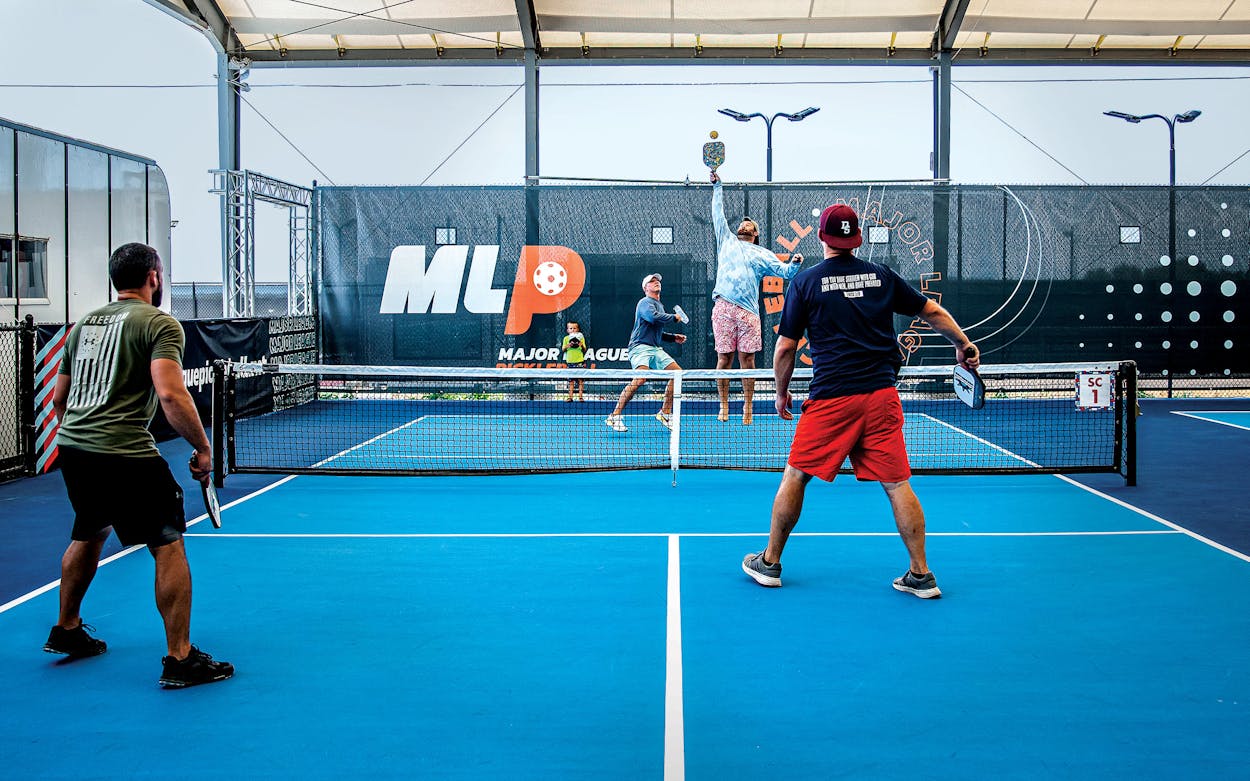Many pickleball devotees first take up the paddle at the urging of a friend. For a disproportionate number of players, that friend is billionaire Steve Kuhn. A financial executive turned philanthropist, Kuhn last year opened Dreamland, a Shangri-la of first-date-appropriate activities including disc golf, miniature golf, and, crucially, pickleball. The 86-acre facility in the Hill Country town of Dripping Springs, one of several such compounds popping up across the state, offers fifteen courts, as well as a beer garden for post-play imbibing. About 6 years after Kuhn started playing pickleball, on the advice of his nephew, the 53-year-old is now a leader among a group of Texas bigwigs betting on the game’s continued growth. He’s also the founder of Major League Pickleball, one of several professional leagues in the U.S. for the burgeoning sport.
Pickleball is tennis’s breezy cousin, though militant tennis players might deny the relation. It’s played on a smaller court, with paddles. Among a certain set (mine), competitors take frequent breaks to sip adult beverages courtside. This doesn’t negatively affect performance, because, at my level, pickleball is a leisurely, low-impact sport. The game’s accessibility has allowed it to catch on with all age groups. About 4.8 million Americans, according to the Sports & Fitness Industry Association, now call themselves pickleballers, dropping words such as “the kitchen” (the zone on either side of the net from which players can’t volley the ball) and “dinks” (difficult shots to return that are hit softly from one kitchen into the other). The pock-pock-pock of the hard plastic ball—louder than the sound of a tennis ball and the source of many a neighborhood disagreement—beckons Americans like a siren song.
“I went to a church gym on a Wednesday night, and I was an addict immediately,” Kuhn, who lives in Austin, said of his first pickleball outing, noting that he is “still not great” at the game. On a warm Sunday in early June, he sat in the bleachers at one of Dreamland’s covered courts with his panting nine-year-old dog, Bella, waiting for the semifinals of an MLP team competition to begin. Surprising for one forged in the flames of hedge funds, Kuhn radiated goodwill. He beamed his cheeks-forward smile at attendees as they took their seats. While on the previous two days of competition many visitors had milled around the turfed area beside the two main courts, ahead of the semifinals the stands were more crowded. Other powerful pickleball ambassadors were arriving too: Kuhn pointed out Brené Brown in a huddle mid-court.


Brown, the best-selling vulnerability guru and Houstonite, owns ATX Pickleballers, one of the twelve teams participating in the MLP competition. (Team names are woefully devoid of pickle puns—a missed opportunity for “Brine-é’s Ballers.”)
Other owners include Texas entrepreneurs Charles Attal and Charlie Walker, of C3 Presents; venture-fund manager Mellie Price; and Nav Sooch, cofounder of Silicon Labs. (A month after the tournament, ex-NFL quarterback and native Texan Drew Brees bought the Mad Drops Pickleball Club.) Well-known non-Texan owners include former tennis star James Blake and serial entrepreneur Gary Vaynerchuk. Like gamers choosing their prizefighters, MLP owners had drafted their players—four per team—in New York in May.
With a $100,000 team prize on the line, the June competition was the MLP’s second tournament; the first was held at Dreamland last fall. After Dreamland, players would be able to participate in two more this year: one in Newport Beach, California, in August, and another in Columbus, Ohio, in October.
An ATX Pickleballer named Altaf Merchant charged up to Kuhn with his phone out, eager to show off texts from a friend in India who was asking what time the match would begin (MLP games are livestreamed online). “India!” marveled Merchant. “India!” said Kuhn, delighted, before the player raced back to his team. In the match that was about to begin, Kuhn explained, the 48-year-old Merchant would face off against Zane Navratil. “Altaf, whenever he beats Zane to a play, gets in his face. It’s hilarious,” Kuhn said. “You’ll see the Altaf hip thrust.”
The teams’ owners took their front-row seats in the bleachers. Brown, wearing her signature gold hoop earrings, a pink scarf, and aviator sunglasses, summoned her four players. They gathered around her as if for a pre-joust blessing from the queen. ATX Pickleballers were about to take on the defending champions, BLQK, a team that belongs to Ritchie Tuazon, a fixed-income portfolio manager from Los Angeles. He also co-owns BLQK Coffee, a social justice–oriented retailer he founded with entrepreneur and former NFL player Justin Watson. Tuazon leaned back in the bleachers as his team warmed up, while Watson appeared just off court and called Merchant over with a shout, holding up a ball for him to sign.
Soon, MLP president Brooks Wiley tossed a coin to determine which team would serve first, but it landed on its edge and rolled away. Merchant hurried over and blew it onto its side. The coin was tossed again—BLQK won—and the match began.
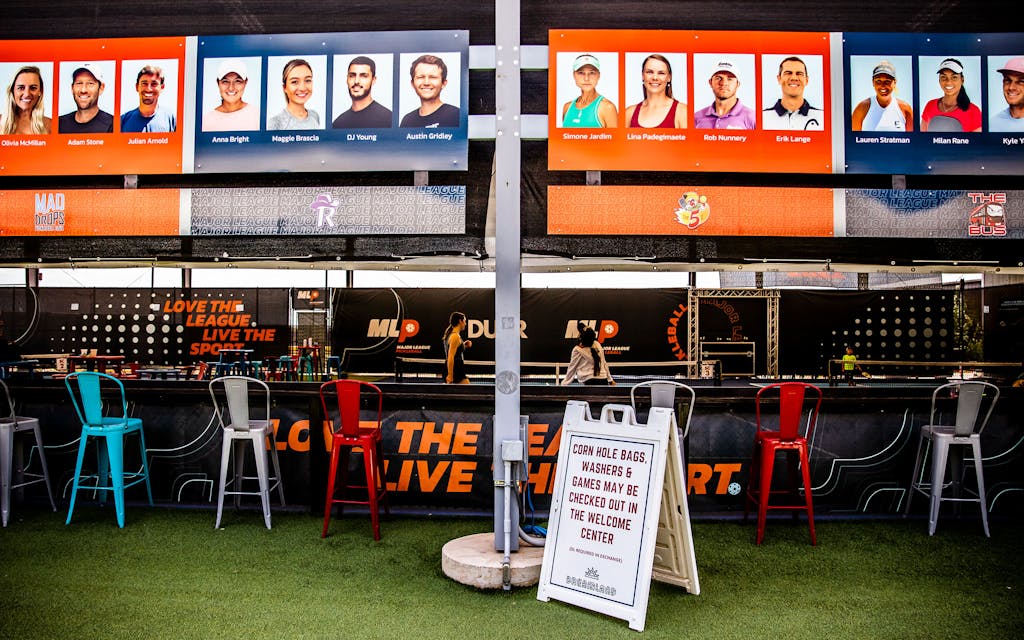
Pickleball has for years been hailed as the fastest-growing sport in the country, but the game’s popularity swelled during the pandemic, when Americans were particularly rabid for social outdoor activities. The Sports & Fitness Industry Association reported a 21 percent increase in the U.S. in 2020 alone, and Kuhn is bullish, predicting that the number of players will soar by the end of the decade.
The sport’s growth has drawn the attention of a wave of investors and entrepreneurs, particularly in Texas. This winter, Dallas-based private investment firm Dundon Capital Partners—whose chairman is Tom Dundon, owner of the National Hockey League’s Carolina Hurricanes—acquired a majority stake in the Professional Pickleball Association, which started in 2017, and Pickleball Central, a massive online retailer. Now two of the major professional pickleball tours, the PPA and the MLP, are owned by Texas billionaires.
Kuhn attributed the state’s sudden status as a pickleball hub in part to “Austin blowing up in every way” but also noted that many professional players live in Texas. Several are even in residence at Dreamland, where they teach and train. “There’s a nexus of pros here,” said Tim Klitch, another finance veteran turned pickleball godfather and a co-owner of MLP team the Ranchers (with oil and gas executive Bryan Sheffield). “The first few came here, then more of them are coming here, and Steve gets the credit for that, in my book.” Kuhn built it; they came.
An infrastructure is growing around the players, both the professionals and the rest of us—the tipsy, sunburned amateurs. But whether the pickleboom continues may depend on engagement in the sport carrying over to television in a meaningful way. Jared Paul, founder of the Kitchen, a vast national pickleball community based in Austin, said he doesn’t see it as a great TV sport. “Everybody wants to be playing pickleball first and foremost,” he noted, versus a sport such as football.
However, Thomas Shields, founder of another Austin-based pickleball start-up, the newsletter company the Dink, is cautiously optimistic that pickleball will keep up its momentum by growing its viewership. Whenever a tournament is broadcast, he said—the MLP finals at Dreamland, for instance, aired on CBS Sports Network—it’s an experiment in camera angles and other strategies. “Nobody has cracked the code,” he added. I mentioned Paul’s concern that pickleball is simply more fun to play than it is to watch. “Look at golf,” Shields said. “Somehow they made that watchable.” (This correspondent begs to differ.)
Pickleball does seem well tailored to in-person spectators. It’s very fast-paced, for one thing. BLQK Coffee’s Watson, a former running back, said that nothing matches the pace of a professional pickleball game: “It’s boom, boom, boom! Who’s gonna get it in!”
The team format of the MLP also creates unusual court dynamics: games comprise one men’s doubles set, one women’s doubles set, two mixed doubles sets, and, in the event of a tie, four mixed singles sets. The game keeps players close enough to one another to be social: teammates do a little paddle tap after missed shots, for instance—pickleball’s equivalent of the beach volleyball tush tap. (I asked Brown what she thinks players are communicating when they do this. “Like, ‘Let’s go.’ ‘Here we go.’ Or ‘LFG,’ ” she said with a laugh.)
And pickleball suffers from none of the staid professionalism of tennis. In the semifinals, Merchant was the crowd favorite. He debuted his signature hip thrust midway through the men’s doubles match: on a return, he hit BLQK’s Rafa Hewett in the chest with the ball, then stormed up to the net and, fists at his sides, directed a prolonged celebratory pelvic wiggle toward his competitor. Hewett, red-faced, regarded Merchant stonily, unamused. Later, when Merchant fumbled a return during the teams’ mixed doubles set, Hewett, who was watching courtside, leaped up from his folding chair and delivered a slow, mocking hip thrust in revenge.
Though the seating area was stickily hot, especially higher up in the bleachers, the spectators were energized—though none more so than the teams’ owners and entourages. BLQK’s cheering section was complemented by Watson, pacing in front of the seated players in a pink T-shirt and white shorts, woofing through his hands and doing high air kicks whenever the team earned a point. Brown wasn’t messing around either. Every time ATX Pickleballers scored, she pogoed to her feet, her right fist raised in triumph. “Let’s go!” she would holler after a particularly good shot.
Brown said she appreciates pickleball as a player because it demands extreme concentration. “It saves me. It’s, like, the only place in my life where I’m not thinking about research or work or carpool,” she said. “I have to take all notices off my watch because if I get a notice while I’m playing and I look, I’ll take a ball to the face.” Her focus seemed to extend to spectating: through the second doubles match, she chewed gum with great intensity, and her aviators were never trained away from the court.
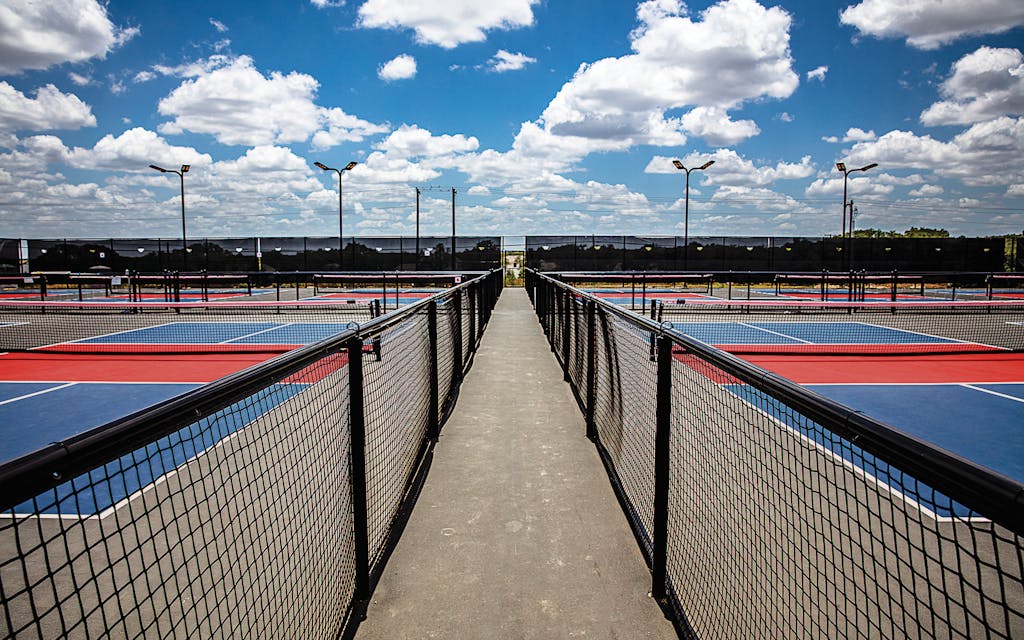
Pickleball offers a low barrier to entry not just for players but for entrepreneurs too. As the sport has taken off, the scaffolding around it has been slower to form, leaving huge windows of opportunity. “I think I just discovered the sport at the exact perfect moment where it was about to hit this inflection point, right when the pandemic started,” said Paul. He had moved to Austin to raise money for a music start-up he’d cofounded, but at the dawn of the COVID era, the timing wasn’t in his favor. A friend invited him to play pickleball at Bouldin Acres, a beer garden with several pickleball courts, and he was a quick convert. After he met Kuhn and Klitch, Paul decided to start the Kitchen, which has grown to 55,000 members and now offers updates and events. “I had no idea that there were even five thousand pickleball players around the country until I started traveling and playing with them, but I just had this hunch that this thing was about to pop,” he said.
For a long time, the Dink’s Shields said, entrepreneurs were building businesses around pickleball, an extension of their own obsession with the game. “Now we’re seeing VCs [venture capitalists] and private equity firms and wealthy individuals getting into this space just as a business opportunity.” Shields said he finds the burgeoning financial interest in pickleball validating—“Hey, I guess we did have a good idea”—but acknowledged that there is an old guard of pickleball aficionados who are wary of big investors entering the sport.
The economics of pickleball are compelling. The greatest opportunity for profit may lie in the courts themselves, which are in such high demand across the state that many tennis facilities are converting courts. Klitch, a longtime tennis player, had been planning to build a tennis center when Kuhn persuaded him to pivot to pickleball. Klitch expects to open Austin Pickle Ranch, in South Austin, next spring. The thirteen-acre compound will boast 33 pickleball courts, sand volleyball courts, an area for lawn sports, and a bar. It’s one of several large pickleball venues in progress in Texas, including a complex in Cedar Park called Electric Pickle and a $3.4 million project recently approved by Southlake, which the city hopes will be the “Taj Mahal of pickleball.”
Klitch explained that compared with tennis clubs, pickleball complexes are much more efficient. “In tennis, probably forty percent of play is singles, sixty percent is doubles . . . so [that one tennis court] is taken up by two to four people who go out there and try to run each other into the ground,” he said. “And then when you’re done, you’re just wiped out. You may have a drink afterwards, but then you go home and take a nap because you’re whupped. So from an efficiency standpoint, you’ve had two people tie up a court for two hours.”
Klitch said he can fit just about four pickleball courts in that same space and that six people might show up per court. “If you’re trying to get people to eat and drink and hang around, do you want two people doing that or twenty-four people doing that?” he said. “I like the numbers around pickleball.”
He also likes that pickleball is an avenue to fitness that isn’t as hard on players’ bodies as tennis can be, and he appreciates the joie of the game. (Being market president of a bank wasn’t particularly fun, he noted.) He called pickleball “a rare confluence of the ability to have fun and the ability to make money” and has dubbed himself the “chief fun officer” of Austin Pickle Ranch.
Klitch marveled at how supportive Kuhn has been of Austin Pickle Ranch, even though the facility will be a Dreamland competitor. Kuhn does seem earnest about the potential for pickleball to bring people together. “What I worry about in our country is we’re not getting along very well,” he told me. “But you know when people do get along is when they’re playing mini golf, when they’re listening to music, when they’re playing pickleball . . . We need more time together not yelling at each other.”
That morning at Dreamland, BLQK won the semifinals against ATX Pickleballers, and later they won the finals against Florida Smash. Even with a $100,000 team prize on the line, the matches retained their backyard conviviality—a rare confluence of fun and money.
Lauren Larson is a writer based in Austin.
This article originally appeared in the September 2022 issue of Texas Monthly with the headline “Pickleball’s Big Shots.” Subscribe today.
- More About:
- Sports
- Business
- Dripping Springs
